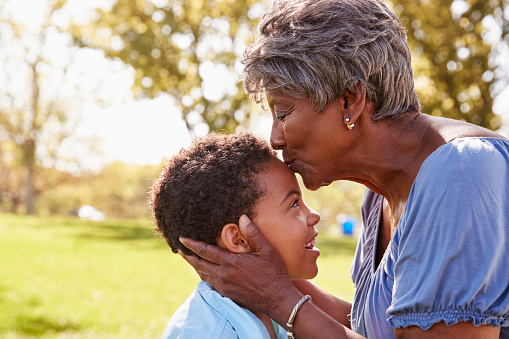Those who have experienced the nurturing care of their grandparents, especially their grandmother can say for sure that they (grandmothers) have nurturing instincts and are ingrained to care deeply about their grandchildren.
Researchers at Emory University in Georgia, southern United States, using functional magnetic resonance imaging (fMRI) scanned the brains of 50 grandmothers whose photos of their grandchildren, aged three to twelve, were shown.
Pictures of an unknown child, an adult parent of the same sex as the grandchild, and an unknown adult were also shown to participants of the study to obtain control data.
The part of the brain involved in emotional empathy and brain areas involved in the movement and motor stimulation and preparation of the engine were monitored and tracked.
James Rillings, an anthropologist and a neuroscientist who led the study, stated that when grandparents are viewing these pictures of their grandchild, they’re really feeling what the grandchild is feeling. For example, when the child is expressing joy, they’re feeling that joy. Likewise, when the children are expressing distress, they’re feeling that distress.
The same brain motor regions also light up in the brains of mothers and are said to be related to the instinct to pick up or approach and interact with a child. Contrarily, when grandmothers looked at photos of their adult children, the brain regions related to cognitive empathy become strongly activated by trying to understand what a person is thinking or feeling and why without too much emotional involvement.
This discovery may be linked to the cute appearance of children scientifically known as the “baby schema,” which the young of many species share to evoke a nurturing response.
This is the first of its kind study. Unlike other primates, humans are “cooperative breeders,” meaning that mothers are helped to rear their offspring.
Similar research on fathers had been previously been conducted, and so attention is focused on grandmothers, to explore a theory in anthropology known as the “grandmother’s hypothesis.”
This asserts that the evolutionary reason that human females tend to live long beyond their reproductive years is to provide benefits to offspring and grandchildren.
The hypothesis to support this has evidently been found in societies including Hadza hunter-gatherers in northern Tanzania, where grandmothers provide feeding tubers to their grandchildren.
Other species such as elephants had been observed to also have the effect and has been seen in killer orcas, which like humans but unlike the vast majority of mammals, also go through menopause.
The brain scan studies of elderly people normally focus on studying conditions like Alzheimer’s disease and so this is really the first at the grand maternal brain, said Rilling.
Grandmothers who are from a cross-section of economic and racial backgrounds were brought in from the Atlanta, Georgia area and, were also asked to complete questionnaires.
There was greater activity in the brain regions of interest in grandmothers who reported a greater desire to be involved in nurturing.
The overall study proves that grandmothers activated the regions involved in empathy and emotional motivation the most strongly compared to the earlier work on fathers though this study doesn’t necessarily apply to a particular individual.
Each subject was interviewed to get a feel for the challenges and rewards of being a grandfather. Consistently, the challenge that emerged the most was the difference of opinion they would have with the parents on how the grandchildren should be raised, their values, and the constant struggle to take a step back.
Grandmothers are better at being more present now that they were freed from the time and financial stress they faced when raising their own children. As a lot of them went to boarding school. They really liked being a grandmother more than they liked being a mother.






